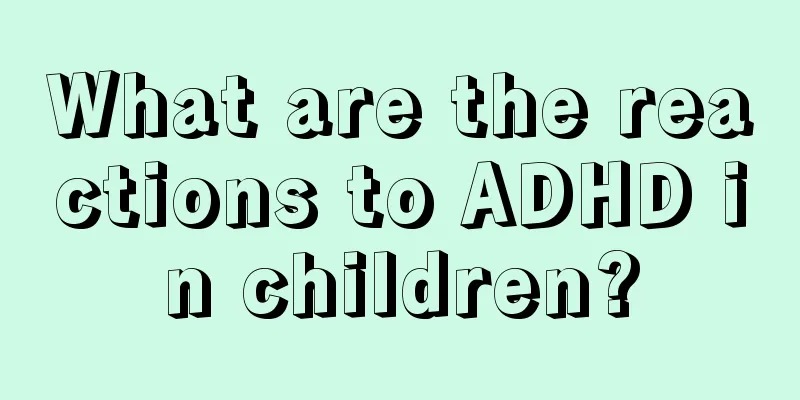Children's head sweats

|
Many parents will find that their children sweat a lot on their heads. This is an adverse reaction and has a great impact on the baby. It is easy for the baby to become dehydrated or have problems with physical growth and development. Faced with this situation, parents need to pay special attention and take timely measures to deal with it. So let’s explain in detail why children sweat on their heads. Sweating is a normal physiological function There are approximately 2 to 5 million sweat glands in human skin, which form a developed sweat system. When the human body is in a high temperature environment, it sweats a lot through physiological regulation, and the evaporation of sweat takes away the heat from the body surface, so that the body temperature does not rise due to the high temperature outside, thus maintaining a constant body temperature. Therefore, sweating is a protective reaction of the human body to adapt to the high temperature environment. Compared with adults, infants and young children have higher water content in their skin, more microvessels on the surface of their skin, and they are more active and have a high metabolism, so more water evaporates from their skin. Furthermore, the secretion of sweat glands is regulated by the autonomic nervous system. The baby's neuroendocrine regulation function is relatively poor, and the cerebral cortex has poor inhibitory function on the autonomic nervous system. Even when sleeping at night, the autonomic nervous system is still in an excited state, so the baby is prone to sweating when he just falls asleep. Reasons for excessive sweating in babies In medicine, the phenomenon of babies sweating excessively is called "hyperhidrosis", which can be divided into "physiological hyperhidrosis" and "pathological hyperhidrosis". Physiological hyperhidrosis For most babies, sweating is a normal physiological phenomenon, medically known as "physiological hyperhidrosis", and there are usually obvious external causes or triggers. like: The weather is hot or the indoor air-conditioning temperature is too high, causing the baby to sweat excessively; ·Babies sweat a lot after playing, running, jumping, or doing strenuous exercise; The baby is overdressed; The quilt is too thick at night, causing the baby to overheat and sweat a lot; Eating spicy foods, such as chili peppers, can also cause excessive sweating. Pathological hyperhidrosis Pathological hyperhidrosis refers to hyperhidrosis caused by certain diseases, and the cause is relatively complicated. Childhood obesity: Obese babies will sweat profusely even when they move or walk. Hypoglycemia: Symptoms include sadness and restlessness, pale complexion, cold sweats, even profuse sweating, and cold limbs. Drug-induced hyperhidrosis: Taking too much antipyretic medicine can cause excessive sweating or even collapse. Acute and chronic infectious diseases: Typhoid fever, sepsis, rheumatoid arthritis, connective tissue disease, lupus erythematosus or blood diseases often cause excessive sweating, and usually require a doctor's diagnosis. ·Children's cardiopulmonary diseases: Children with congenital heart disease, pneumonia and heart failure often sweat profusely. Rickets in children: Hyperhidrosis is an important characteristic manifestation of rickets in the active stage, usually accompanied by symptoms such as crying at night, bald spots on the back of the head, ping-pong head, square skull, enlarged anterior fontanelle and delayed closure. ·Pediatric tuberculosis: Babies with tuberculosis not only sweat a lot in the first half of the night, but also in the second half of the night before dawn, which is called "night sweats". It is also accompanied by poor appetite, low or high fever in the afternoon, flushed face, weight loss, etc. Some people may also have cough, liver and spleen |
>>: Why is the child's back sweating?
Recommend
Treatment of a child with a high fever of 39 degrees
I wonder if your children often have a high fever...
Whose blood type did my daughter inherit?
I believe that many parents are more concerned ab...
What are the daily care for children with tonsillitis?
Tonsillitis is a common upper respiratory tract i...
What are the calcium supplement recipes for children?
During the growth of children, calcium is an indi...
Six common items in daily life are dangerous to children
Nowadays people's lives are more colorful tha...
Common skin problems in babies
The baby's skin is the most tender, and at th...
What should I do if my two-month-old baby has a white coating on his tongue?
When the baby is still breastfeeding, white coati...
Three-year-old baby with stuffy nose
If nasal breathing is blocked, people will breath...
What to do if your 6 month old baby has diarrhea
It is very common for 6-month-old babies to have ...
Children's foreskin swelling
Many children wear open-crotch pants when they ar...
Developmental indicators of 1 and a half year old baby
One and a half year old babies have their own dev...
What is the normal range of hemoglobin in children?
The hemoglobin that people often talk about is ac...
What are the tips for treating frequent urination in children?
Parents with children at home will definitely hav...
What to do if your baby's face is swollen
Children's bodies are in the process of devel...
What should I do if my baby has very loose stools?
It is normal for babies to have loose stools when...









